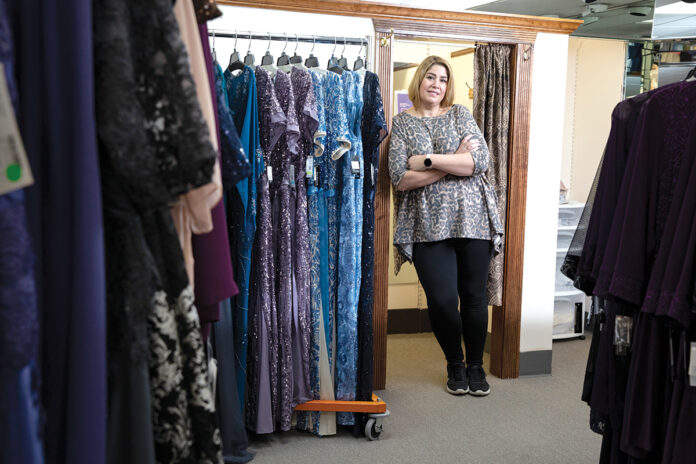Janet Tanury had been dutifully putting away money for retirement for years and was even considering doubling her contribution.
Then, COVID-19 hit, shutting down Botticelli LLC, her North Providence plus-size clothing boutique, and costing what the longtime small-business owner estimated to be $100,000 in revenue over the last nine months. Suddenly, growing her retirement nest egg no longer seemed like a luxury Tanury, 42, could afford as she struggled to keep her business afloat through months of closure and lack of eligibility for federal relief programs.
Tanury has stopped contributing to her 401(k), and as the state approaches another potential lockdown, is considering taking advantage of the Coronavirus Aid, Relief, and Economic Security Act provisions that allow people to tap into their retirement accounts through withdrawals or loans without the usual 20% tax penalty.
As of Oct. 31, 1.3 million people have taken a CARES Act distribution from their employer-based retirement accounts with Fidelity Investments Inc., roughly 5.2% of those enrolled in eligible plans, according to Fidelity research. Another 81,000 have taken loans.
While a majority of participants have still left their retirement accounts untouched, a possible nationwide lockdown amid a second surge in cases could mean bad news even for those who have not yet tapped into their retirement savings, said Jeanne Thompson, senior vice president of workplace consulting for Fidelity.
In the most recent month of data, from Sept. 30 to Oct. 31, Fidelity research shows an uptick in the amount of money participants were taking out. Average withdrawals increased from $9,000 to $10,000, with the median rising from $2,400 to $3,000.
‘You have three choices: die before you retire, be poor, or save.’
JAMES W. DIAMOND, Diamond Financial Services owner
Those taking out money are by no means depleting their accounts – the average withdrawal represents roughly 10% of most clients’ total savings. However, this data also fails to capture the reality for some of the hardest-hit people and industries: small-business owners and workers in retail and hospitality.
Many wealth-management companies’ employer clients represent “knowledge-based industries” that have been able to keep workers employed remotely despite shutdowns and restrictions, said James W. Diamond, owner of Diamond Financial Services in Warwick.
Hotel and restaurant workers may not even have jobs that offer retirement plans, given the part-time nature and high turnover that often characterizes those industries, added Sean McGarry, vice president and retirement plan manager for Rockland Trust Co.
“The piggy bank really isn’t there for people in those businesses, who are just taking the brunt of this in a lot of cases,” McGarry said.
Perhaps those most at risk are the small-business owners such as Tanury, who would sooner drain their retirement accounts than close the companies into which they’ve poured their lives.
“I kid and tell people I will be working until noon on the day of my funeral,” Tanury said.
Carrie McPherson, financial adviser with BeaconPoint Wealth Advisors, which serves as Tanury’s 401(k) adviser, has encouraged her clients to take a loan over a distribution if they need to access retirement savings. Ideally, though, she and other financial planners are advising clients from leaving their 401(k)s untouched, if possible.
Diamond put it more bluntly.
“Pandemic or not, you have three choices: die before you retire, be poor, or save,” he said.
Fidelity’s research suggests most people are still opting for the third choice. Across 401(k), 403(b) and Roth individual retirement accounts, employers and employees are contributing to their defined-contribution plans at the same rate quarter over quarter.
That employers have largely held matches steady, and in some cases amped up offerings such as education and alternate, emergency fund options amid the pandemic, is a bright spot in these challenging times, said James L. Worrell, northeast managing director for Strategic Retirement Partners.
Another high note? The market’s quick recovery after the precipitous drop in the early days of the pandemic, which means average balances are increasing, even if contribution rates are the same.
“This is really driving home the point [that] Main Street does not equal Wall Street,” Worrell said, “The economy is in shambles, but the stock market is doing well.”
That’s especially good news for those who have taken a distribution or loan from their defined-contribution plans, McGarry said, noting that the strong stock market performance means the “wind’s on their back” when it comes to making up that loss.
The coronavirus crisis still holds potentially disastrous long-term effects for both individual retirement plans and the larger economy. People who take out money now may have to work longer, or spend less in retirement, McGarry said.
Overwhelmed by the day-to-day stress of keeping her business alive, Tanury has not yet begun to strategize about how she can make up the loss to her own retirement nest egg.
“As a small-business person, I have to compartmentalize,” she said. “I just can’t think about that yet.”
She added, “When this ends, we’re not going to walk away full of money. It’s going to take a long time to recover.”
Nancy Lavin is a PBN staff writer. Contact her at Lavin@PBN.com.













